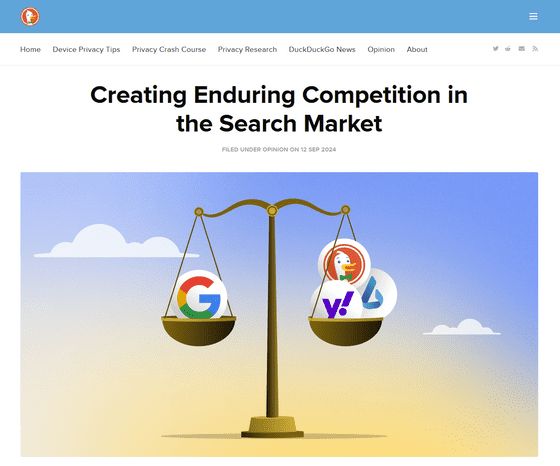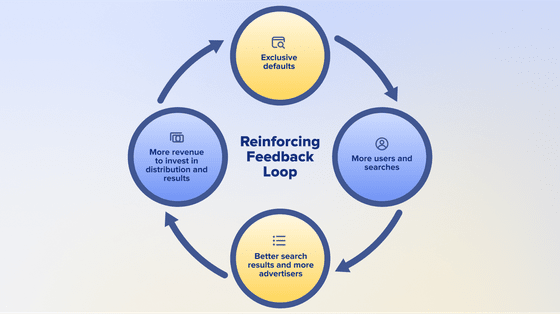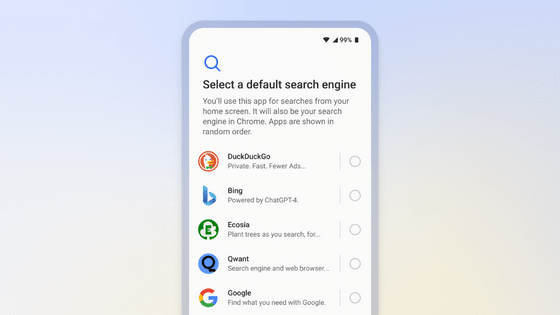Search engine DuckDuckGo suggests 'how to beat Google'

Since the August 2024
Creating Enduring Competition in the Search Market
https://spreadprivacy.com/creating-enduring-competition-in-the-search-market/

According to DuckDuckGo, it is not impossible to establish a permanent competitive landscape in the search market, encouraging new entrants and innovation so that multiple competitors can capture significant market share.
However, DuckDuckGo points out that there is no silver bullet that can eliminate Google's multiple advantages at once, so any measures to combat Google's monopoly must be a package that combines a series of effective remedies.
◆ Competing against Google's size advantage in accessing search results
Discussions of Google's dominance often focus on its 'distribution advantage,' such as paying Apple big bucks to make Google search the default search engine in Safari, but DuckDuckGo says it's also important to address its 'scale advantage.'
For example, in the antitrust case mentioned above, the court noted that 'an analysis of 3.7 million unique query phrases from Google and Bing showed that 93% of the unique phrases were found only on Google, and only 4.8% were found only on Bing.'
Google takes advantage of the abundance of unique queries, known as 'long tail queries,' to run large-scale experiments and continually improve its search results in ways that competitors without Google's massive scale can't.

As a technical intervention against this issue, DuckDuckGo suggested that 'the best and fastest way to eliminate this inequality is for Google to provide access to search results through its real-time API on fair, reasonable, and non-discriminatory (FRAND) terms. That means that competitors would have access to the same search results for any query that may be entered into the search engine.'
If Google were forced to license its search results in this way, it would allow existing search engines and potential market entrants to build their services on top of Google's various modules and indexes, offering consumers more competitive and innovative choices.
There are concerns that such interventions could lead to other search engines inheriting the privacy issues of Google Search, but Google's search results license does not include access to user data, so privacy would not be violated. DuckDuckGo is a leader in this field, and 'experience shows that this remedy can be implemented anonymously,' it said.
Some have also expressed concern that search results for long-tail queries will become similar, but DuckDuckGo concluded that if search results are licensed under FRAND terms, each search engine will be able to change its rankings to provide more unique search results.
◆ Disable self-prioritization on Chrome and Android to negate Google's distribution advantage
In the aforementioned trial, evidence was presented that showed that many users unknowingly search on Google because it is the default search.
For example, a 2020 Google survey found that more than 50% of American iPhone users 'don't know' what search engine they use in Safari.
In particular, DuckDuckGo has taken issue with Google favoring its own search engine on Chrome and Android, which it sees as platforms 'developed to extend the reach of Google Search.'
Therefore, DuckDuckGo proposed to display a selection screen that allows users to choose their default search engine when setting up or using Android or Chrome, and to allow users to choose their default search engine periodically.

In addition, the report lists other small but important remedies, such as 'limiting exclusive contracts,' 'continuous monitoring to ensure that Google does not exploit regulatory loopholes,' and 'organizational reform at Google,' although these would not directly counter Google's dominance.
Regarding the improvement of the search market through these interventions, DuckDuckGo said, 'The problems of uneven competition caused by Google's dominance are deep-rooted and will not be resolved overnight, so it will take a long time for competition to take root in the search market. However, we believe that a package of remedies designed to address specific bottlenecks, well-implemented and carefully monitored, can create lasting competition in the search market.'
Related Posts:
in Free Member, Web Service, Posted by log1l_ks







